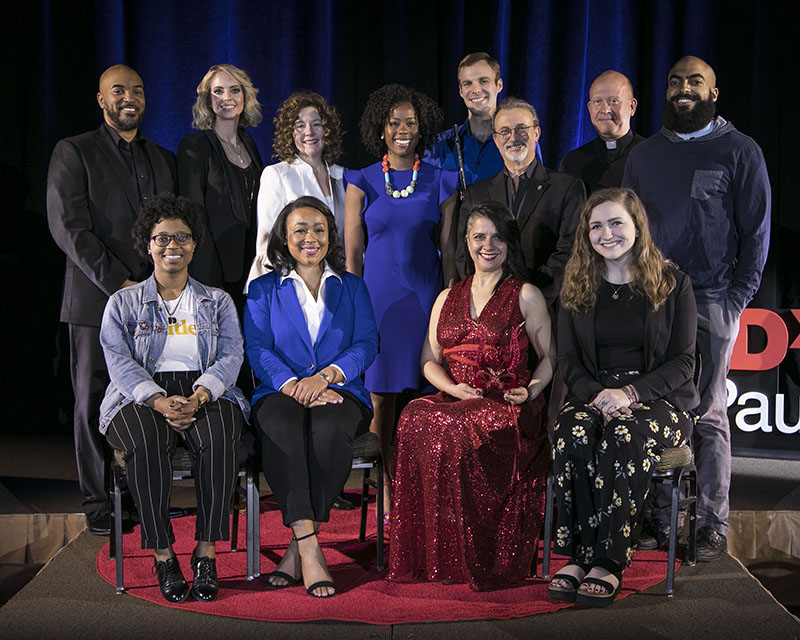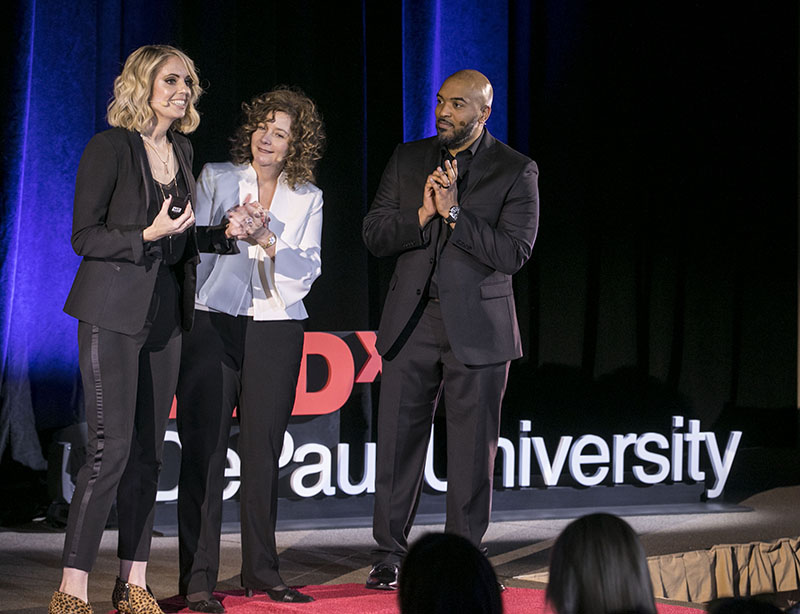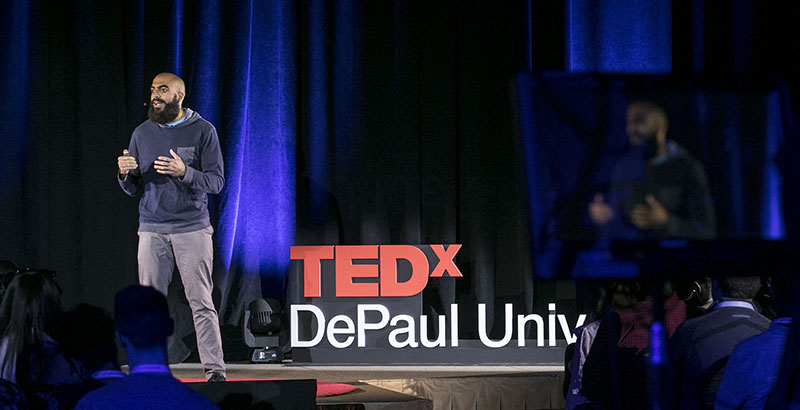 Eleven speakers, including students, alumni and faculty members , participated in the 2018 TEDxDePaulUniversity event.
Eleven speakers, including students, alumni and faculty members , participated in the 2018 TEDxDePaulUniversity event.Three
business doctoral students and an MBA student were among this year’s lineup of
11 TEDxDePaulUniversity speakers on May 1. Karen Bartuch, Tammy Higgins and
Brandon Hendrix, who are currently pursuing degrees in DePaul’s
Doctorate of Business Administration (DBA) program, delivered a
talk together on the benefits of humor in the workplace. MBA student Kevin
Felisme delivered a talk on using economic development to reignite low-income
Chicago communities.
During the third annual event, DePaul faculty, students and alumni gave talks and
performances that centered on the theme “Reimagine” – topics that challenged
the status quo, systems and standards of today. The half-day program featured
presentations that ranged in subject from
forgiveness in the wake of an attack to rethinking the way listeners engage
with music. Fresh ideas about leadership, business, self-care and how
we communicate were explored.
According to Newsline, a
record-breaking 114 speaker applications submitted for this year’s event, a 46
percent increase from 2017. The selection committee chose applicants who
introduced novel understandings or unconventional approaches that frame the
theories, technologies and truths of tomorrow, and who are devoted to creating
“ideas worth spreading” in 18 minutes or less.
Team Funny Business: Karen Bartuch, Tammy Higgins, Brandson Hendrix | DBA Class
of 2018
“Funny Business”
 Humor researchers Karen Bartuch, Tammy Higgins and Brandon Hendrix, left to right, present their joint talk “Funny Business” at TEDxDePaulUniversity in the Lincoln Park Student Center.
Humor researchers Karen Bartuch, Tammy Higgins and Brandon Hendrix, left to right, present their joint talk “Funny Business” at TEDxDePaulUniversity in the Lincoln Park Student Center. How can humor benefit the workplace? That’s the question Bartuch, Higgins and
Hendrix have been studying for the past three years as part of their doctoral
research in the DBA program, titled “Funny Business.” During the TED talk, the
speakers discussed their research findings and the benefits of humor –
including increased resilience, organizational effectiveness, job satisfaction,
team cohesion and psychological well-being. They also shared personal stories
from their careers and discussed how humor has helped to diffuse tension, build
camaraderie and work as a coping mechanism.
They also shared tips on how to use humor appropriately in different work
situations.
Higgins, senior sales solutions partner for Orange Business Services, recommended a way to make meetings better for employees. “Start off your next conference call or web meeting with a brain teaser and don’t divulge the answer until the end of the call,” she says. “We’ve done this in a few of our meetings, and we’ve found that most people stay engaged until the end of the meeting when you get to hear the highly sought-after answer.”
Bartuch, who works as director of research and strategy at Sandstorm Design, also shared how to use humor at the beginning of a meeting, presentation or conference
in order to set a positive tone. Hendrix, a data analytics specialist for the U.S. Department of Defense, provided
advice on how to be memorable at networking events.
Kevin Felisme (MBA ’19)
“Reimagine Chicago: Power to the People”
 Kevin Felisme, an MBA student, presents his talk, “Reimagine Chicago: Power to the People,” at TEDxDePaulUniversity in the Lincoln Park Student Center.
Kevin Felisme, an MBA student, presents his talk, “Reimagine Chicago: Power to the People,” at TEDxDePaulUniversity in the Lincoln Park Student Center.
During his TED talk, Felisme – who works at Mercy Home for Boys and Girls, a therapeutic residential facility for youth in Chicago – asked the audience to “reimagine the city of Chicago.”
According to a 2016 study, the University of Chicago found that five Chicago
neighborhoods alone have accounted for nearly half of the city’s overall
homicide increases, Felisme says. Those neighborhoods include Austin, Englewood, New City, West Englewood and Greater Grand Crossing.
Felisme also discussed the impact of unemployment and violence on these
communities. Drawing from his own experience of living in a single-parent home
in Manchester, N.H., Felisme highlighted the stress of living
paycheck-to-paycheck, and how violence can negatively impact a child’s brain.
He also talked about Chicago’s history of racist policies and practices of
discriminating against African Americans, including redlining – when banks
refuse to provide loans to African Americans who want to live in white
neighborhoods – and overcrowded public housing.
To begin revitalizing these low-income communities, Felisme believes the
“conversation needs to begin with economic development.” His idea is to develop
programs, supported by either public or private dollars, that will allow
neighborhood residents to own and operate businesses within the community.
“It’s always important to allow the people to be a part of the process,”
Felisme says. Hiring people from the community and enrolling them in a unique
apprentice program, he says, “ will equip employees with the knowledge and
education needed to operate a business. I am thoroughly convinced that this can
happen. I’ve got a lot to figure out, but in order to reimagine, you must think
about what is currently impossible and find ways to make it possible, right?”
Learn more about DePaul's graduate business programs